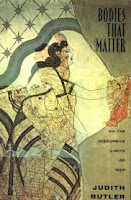#4: Ethics 6/12/18
Thursday 6 December | 5 - 6.30pm | LHRI | All welcome For our fourth session of the year, we will be reading the second chapter of Precarious Life (2004), 'Violence, Mourning, Politics' alongside 'Precarity Talk' - a roundtable discussion of the topic between Butler and several other leading theorists. In 'Violence, Mourning, Politics , ' Butler develops a theory of nonviolent ethics stemming from the acceptance that it is our vulnerability, and vulnerability to death and violence in particular, which connects us as humans. Adopting a relational view of the self, she reconfigures grief as a public, social experience which could and should be harnessed as a force for transformation, particularly in rethinking notions of community and international relations. State violence, she argues, is a consequence of the fact that modern nation states are founded on the principle of denying such vulnerability. Citing the US's military violence in the Middl...







